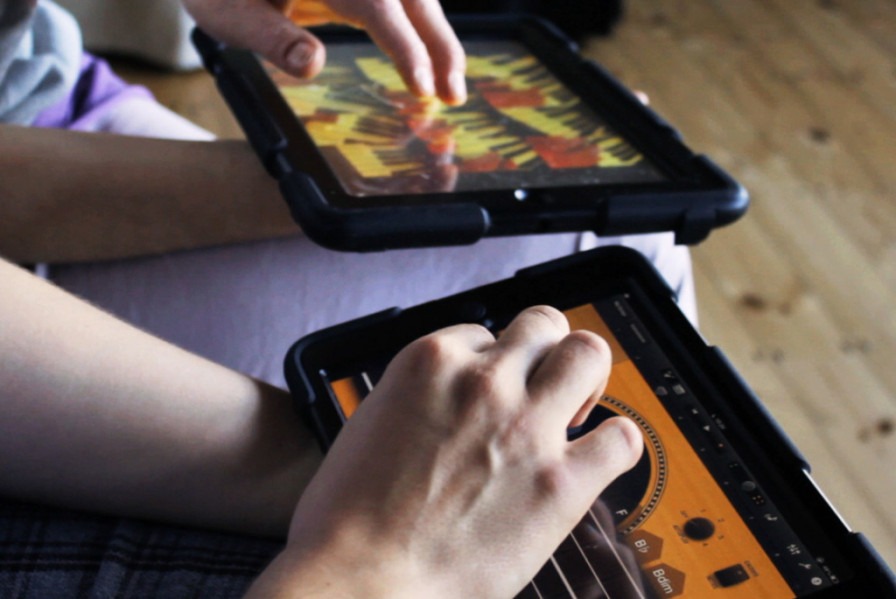Giving Disabled Children the Chance to Take Control: A Mentee's Reflections

We had a visit recently from the amazing, Sophie Partridge who is an actor, writer and workshop artist. She is currently taking part in a mentoring programme with Drake Music and her mentor is the equally amazing, Graham Dowdall who also works with us here at Rhythmix. As part of the mentor programme, Sophie got in touch to ask us if she could come and see Graham working on our project at Chailey Clinical Services in East Sussex. This project is part of our Youth Music funded Wishing Well programme which takes participatory music making into healthcare settings across the county. Chailey Clinical Service is a residential ward for young people with very complex health needs and disabilities. We were delighted to welcome Sophie to the project; here are her reflections (we have changed the names of the participants)
As part of my mentoring with Drake Music, I asked my mentor, Graham Dowdall if it would be possible for me to observe his sessions at Chailey Clinical. Graham’s sessions involved him working 1 to 1 with a small group of disabled young people, who varied as much in age as impairment but other than that, I wasn’t sure what to expect. That label of `profound & multiple disabilities’!
If I had a preconception about attendees of such a session at Chailey, it was that these would be disabled people who, with the best will in the world, are done “to” and “for”. Through working with Graham, I knew that the aim of the session was to provide an opportunity for people to do for themselves and that can only be a good thing. When Ben woke up, his Support Worker said “Bet you’re wondering why you’re not in bed!” (with that cold I would have wanted to be!).
This for me, this seemed an indication of how little control Ben and Jack have over their lives. To be able to exert any influence at all over their environment and activities, even if `only’ activating sound through an app, is therefore important. It is a “can” amongst the “cant’s” of a disabled person’s experience. I have no problem with all the “cant’s” in my life but I very much value my “cans” and have a feeling so do Ben and Jack. They asserted themselves in the session and through their own actions. It takes communication, trust and time between all those involved; Ben and Jack, Graham as `facilitator’ and the support workers to achieve that.
Both Ben and Jack, with what I felt to be considerable effort on both their parts, activated soundscapes through minimal hand movements across iPad screens. Although unable to hold the more ‘traditional’ instruments, Graham used them to accompany their iPad soundscapes and music was made.
At the beginning of the session, it seemed we wouldn’t take up the allotted 2 hours as there were only 2 participants but even with the health challenges encountered, challenges that are everyday occurrences for both young men and those who support them, we reached the end of that time easily.
I enjoyed the session. I think Graham, Ben and Jack and those that supported them did too. When people are nonverbal, enjoyment and satisfaction are expressed differently; eye contact, hand gesture and a smile of recognition and appreciation of someone’s presence with joint effort to access music, say just as much as words. And being able to initiate sounds & music of your own choosing! No one need be powerless or without control, devoid of pleasure or expression what-ever their needs are. I just hope Ben and Jack have these opportunities increased.
Sophie’s observations really get to the heart of Graham’s work at Chailey. This is patient, frankly quite tricky work and Graham has devoted hours and hours into a building a relationship with these young men that enables them to be creative in their own way and that allows Graham to recognise the subtle signs of engagement, experimentation and creativity. Ben and Jack are full time residents at Chailey and their opportunities to engage with people, things and ideas from the “outside world” are more limited than any of us can really understand.
But once a week, Graham arrives. Graham is a community music legend who is responsible for training most of our team here at Rhythmix, myself included (he likes to remind me that I wasn’t the best student back in the day.) His commitment to finding a way to make music with Ben and Jack is extraordinary and he does it in a way that is completely appropriate to their musical tastes. It’s a bit uncomfortable to talk gender sometimes but it’s been important for these young men to have a male figure in their lives. The staff at Chailey told us a long while back that they are surrounded by female carers, nurses and support workers. They have no other men in their lives; let alone one with whom they could make a bit of dubstep.
Our huge thanks to Sophie for visiting our work and sharing her thoughts with us. You can find out more about her work here:http://sophiepartridge.co.uk
Jo White
Programme Director for Wishing Well
Rhythmix
